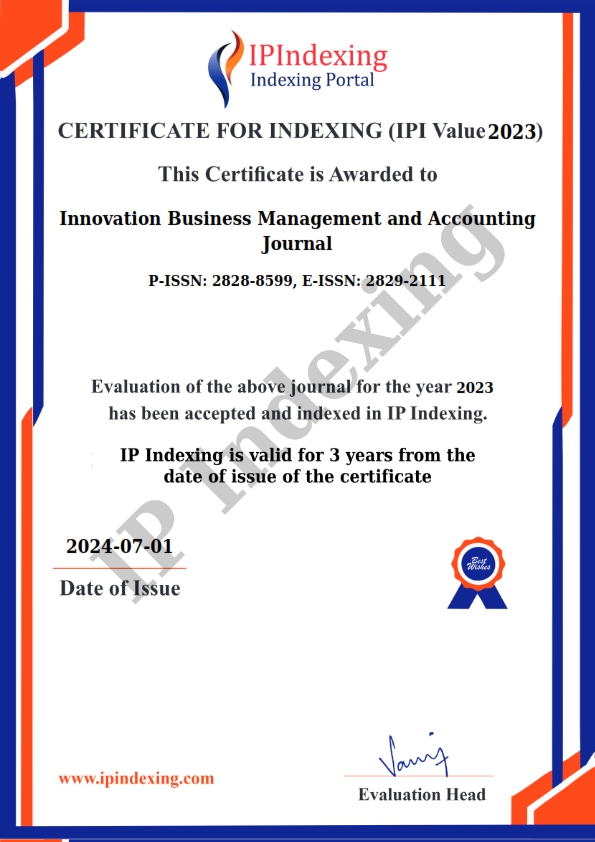Analysis of the Values of Shadow Puppet Art in Strengthening the Code of Ethics for Accountants
DOI:
https://doi.org/10.56070/ibmaj.2024.027Keywords:
Accountant's Code of Ethics, Javanese Culture, Shadow PuppetryAbstract
This research is a literacy study (literature review study) which is a description of several theories, evidence, and other research from various sources (Hasibuan, 2007). The data analysis method is also used in this research, which is descriptive analysis with stages of accumulating data from various previous studies, both national and international research, analyzing the information, and then providing explanations and descriptions of Javanese cultural values, one of which is shadow puppet culture which can function as reinforcement. Accountant's code of ethics. The results of this research show that the Code of Ethics for Accountants adopted from Western culture cannot solve problems in Indonesia. Therefore, the accounting profession currently in Indonesia must understand that foreign culture is very different from the ethical rules that can be adapted to the ethical principles of accountants in Indonesia. Community culture is considered more appropriate for implementing the code of ethics in Indonesia and can be the basis for proposals for developing ethical accounting principles based on local culture, one of which is shadow puppetry.
Downloads
References
Bertens, K. (2020). Pengantar Etika Bisnis. Penerbit Kanisius.
Bohlala, H. (2022). The Role of External Auditor in Enhance Trust in the Accounting Profession (Doctoral dissertation, Alliant International University).
Carnegie, G. D., & Napier, C. J. (2010). Traditional accountants and business professionals: Portraying the accounting profession after Enron. Accounting, organizations and society, 35(3), 360-376. https://doi.org/10.1016/j.aos.2009.09.002
Ginting, J. S., Sumarno, E., Karina, N., & Lubis, M. A. R. (2020). Maintaining Local Wisdom-Building a Harmonious Life: Inter-Ethnic Relations in Paya Itik Village, Galang District, Deli Serdang Regency. Budapest International Research and Critics Institute (BIRCI-Journal): Humanities and Social Sciences, 3(4), 3598-3607.
Handayani, O. W., Nugroho, E., & Hermawati, B. (2020). Determinant of diabetes mellitus focusing on differences of Indonesian culture: Case studies in the Java and outer java region in Indonesia. The Open Public Health Journal, 13(1), 323-330.
Herbert, I. P., Rothwell, A. T., Glover, J. L., & Lambert, S. A. (2021). Does the changing world of professional work need a new approach to accounting education?. Accounting Education, 30(2), 188-212. https://doi.org/10.1080/09639284.2020.1827446
Kristianti, I. P., & Kristiana, D. R. (2020). Role of Locus of Control and Understanding of Accountant Ethics on Accountant Ethical Behavior. Jurnal Reviu Akuntansi dan Keuangan, 10(1), 79-92. https://doi.org/10.22219/jrak.v10i1.9415
Leiwakabessy, A. (2010). Pengaruh Orientasi Etis dan Budaya Jawa terhadap Perilaku Etis Auditor. MAKSI, 10(1), 1-15.
Maryani, T., & Ludigdo, U. (2001). Survei atas faktor-faktor yang mempengaruhi sikap dan perilaku etis akuntan. Jurnal Tema, 2(1), 49-62.
Melnyk, N., Trachova, D. Y., Kolesnikova, O., Demchuk, O., & Golub, N. (2020). Accounting trends in the modern world. Independent Journal of Management & Production, 11(9), 2403-2416. https://doi.org/10.14807/ijmp.v11i9.1430
Moleong, L. (2011). Metode Penelitian Kualitatif. PT Remaja Rosdakarya.
Purba, M. P. (2017). Profesi akuntan publik di Indonesia. Graha Ilmu.
Rahayu, S., & Rusmawan, R. W. (2010). Analisis faktor-faktor yang mempengaruhi minat untuk mengikuti program pendidikan profesi akuntansi (PPAk). Simposium Nasional Akuntansi XIII Purwokerto, 1-21.
Sopanah, A., Hasan, K., Putra, S. K., & Rusdianti, I. S. (2023). Akuntabilitas publik organisasi nirlaba. Scopindo Media Pustaka.
Sylvander, J. (2020). The influence of clients on the social identities within the audit profession (Vol. 784). Linköping University Electronic Press.
West, A., & Buckby, S. (2023). Professional judgement in accounting and Aristotelian practical wisdom. Accounting, Auditing & Accountability Journal, 36(1), 120-145. https://doi.org/10.1108/AAAJ-09-2020-4949
Downloads
Published
How to Cite
Issue
Section
License
Copyright (c) 2024 Sintia Nur Afifah, Mariska Nur Hanifah, Fitria Auldri, Hudri Ahmad Hudori, Asep Alfarizi Yulianto, Muhammad Aras Prabowo, Fitriah Ulfah, Lusiana Putri Ahmadi

This work is licensed under a Creative Commons Attribution-ShareAlike 4.0 International License.



